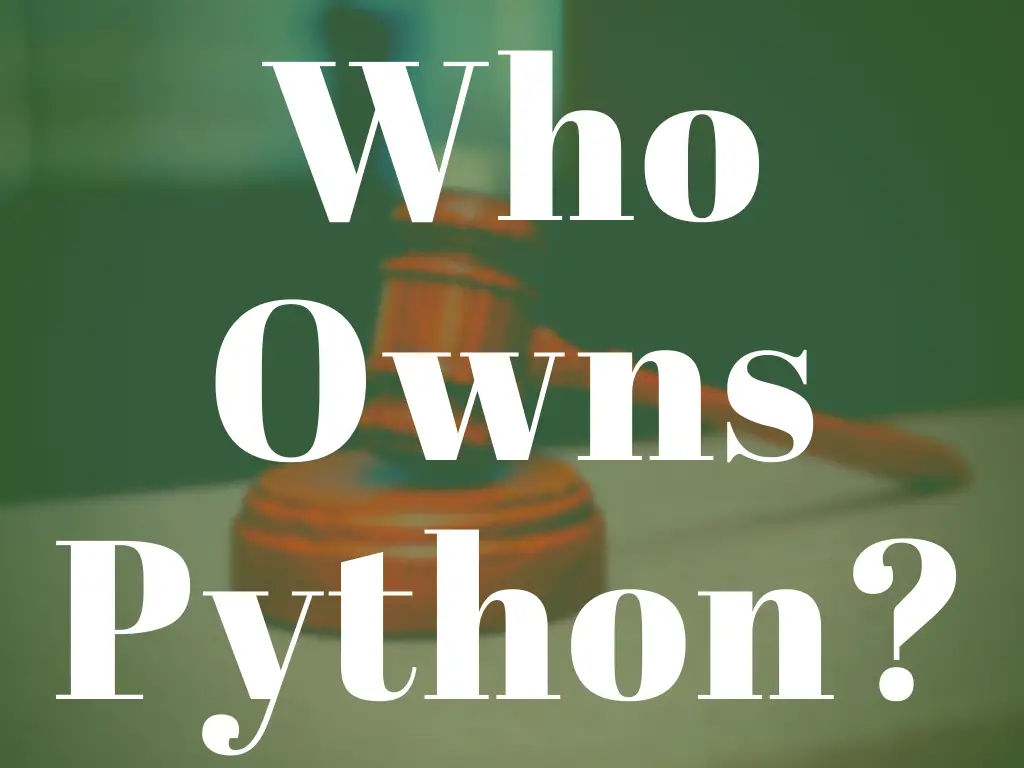Who Owns Python?

Python is one of the most popular programming languages - many operating systems come with Python pre-installed by default. But is it really free to use for everyone? Who holds the ownership of Python as a platform?
The intellectual property rights behind Python are owned by the Python Software Foundation. Python is currently distributed under the PSF License Agreement (a GPL compatible license), which means it is completely free to use, share and modify it.
It is worth noting however, that PSF does not hold any of the ownership rights of the Python source code, those are retained by the original contributors.
What License Does Python Use? Who Owns The License?
Creation, First Release And The Early Days
As you probably know, Python was created by Guido van Rossum in the 1980s. The inital release came out in February 1991 (version 0.9.0). Version 1 was released 3 years later, in 1994 - at this time Guido was working at Centrum Wiskunde & Informatica (CWI) - so as a result the initial licensing rights were held by CWI.
CWI distributed Python under the Historical Permission Notice and Disclaimer (HPND), which is a GPL-compatible license. HPND is an old license, not in use anymore, it’s been deprecated since 2015.
The Python License
In 1995 the licensing rights were obtained by Guido’s new employer - the Corporation for National Research Initiatives (CNRI). Along with the new owner, came a new type of license for Python: versions 1.6 and 2.0 were released under the Python License. This BSD-like license was specifically created for the Python programming language, but it had to be deprecated due to its incompatibility with GPL.
The Python Software Foundation And The PSF License
2001 was a big year for Python: The Python Software Foundation (PSF) was created. The goal of the PSF is to support the Python community and to promote and protect the language itself. Since its founding in 2001, PSF holds all the intellectual property rights related to the Python programming language.
Just like before, the new owner meant a new license: nowadays Python is distributed under the PSF license. The PSF License is a GPL-compatible license: the biggest difference between the two is that the PSF License is not a copyleft license, which means that the PSF License does not require derivative works to have the same permissive licenses.
Is Python Free For Commercial Use?
Python is open source and completely, free both for non-commercial and for commercial use. The PSF License is approved by the Open Source Initiative which means that it’s guaranteed to comply with the Open Source Definition: free to use, free to modify, and free to share.
Who Owns The Python Source Code?
Python contributors always keep the ownership of the code they write. They only license the rights to the PSF as part of the contribution process - using a permissive license like Academic Free License version 2.1 or Apache License version 2.0. This way the PSF can demonstrate that each line of code was licensed to it by someone who has the necessary ownership rights to that piece of code.
Is The Name Python A Trademark?
The name “Python” is a registered trademark of the Python Software Foundation. However, they do encourage the nominal use of the trademark, meaning you are always allowed to use it when referring to the original Python programming language. However, it is not allowed to use it for a different/new programming language or piece of software/documentation unrelated to the original Python project.
Are You Allowed To Use The Python Logo?
In the context of Python-compatible software products - or programs written in Python, PSF also permits the usage of the unmodified, original Python logos - without prior approval.
Summary
Python had several different owners and licenses over the course of its history, but currently it is distributed under the PSF License. Ownership rights belong to the original authors of each individual contribution, but all these contributions are then licensed to PSF.
Related Articles
- When Will Python 4 Be Released?
- Is Python Owned By Microsoft?
- Is Python Owned By Google?
- Who Is The CEO of Python?
